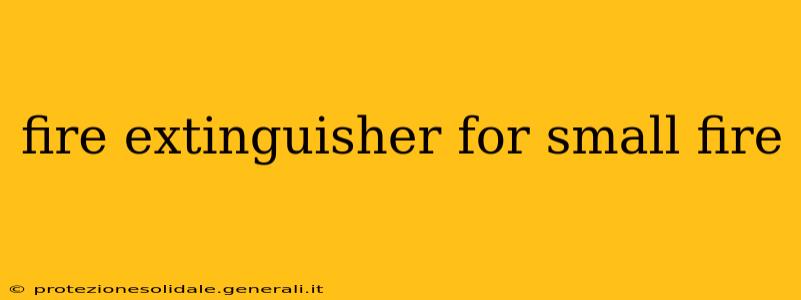Small fires can quickly escalate into major emergencies, causing significant property damage and posing serious risks to life and safety. Knowing how to choose and effectively use a fire extinguisher is crucial for everyone. This guide will help you understand the types of fire extinguishers best suited for small fires and how to select the right one for your specific needs.
What Types of Fire Extinguishers Are There?
Fire extinguishers are classified according to the types of fires they can effectively extinguish. Understanding these classes is paramount in selecting the appropriate extinguisher for your home or workplace. The most common classes are:
-
Class A: These extinguishers are designed for ordinary combustible materials like wood, paper, cloth, and some plastics. They typically use water or a water-based solution.
-
Class B: These extinguishers tackle flammable liquids like gasoline, oil, grease, and paint. They usually contain carbon dioxide (CO2), dry chemical, or foam agents.
-
Class C: These extinguishers are specifically for electrically energized fires. They employ non-conductive agents like CO2 or dry chemical to prevent electrical shock.
-
Class D: These are for flammable metals like magnesium, titanium, and sodium. They require specialized extinguishing agents and are less commonly found in homes.
-
Class K: These extinguishers are designed for cooking oils and greases found in commercial kitchens. They employ a wet chemical agent to prevent reignition.
Often, you'll find multi-purpose fire extinguishers that cover multiple classes (e.g., ABC).
What Size Fire Extinguisher Do I Need for a Small Fire?
The size of the fire extinguisher you need depends on the potential fire hazard in your space. For small fires in a home or apartment, a 2A10BC or similar rating is generally sufficient. The numbers and letters indicate the extinguisher's capacity and the classes of fire it can handle. A larger extinguisher might be more appropriate for larger spaces or those with more significant fire risks, but for small fires, a smaller, more manageable unit is often ideal. Always check with local fire safety regulations for specific recommendations.
What is the Best Type of Fire Extinguisher for a Small Home Fire?
The best type of fire extinguisher for a small home fire is usually an ABC extinguisher. This is because it covers the three most common classes of household fires:
- Class A: For burning furniture, paper, or other solid materials.
- Class B: For grease fires in the kitchen or flammable liquids.
- Class C: For electrical fires (though always disconnect power if safe to do so before using an extinguisher).
A good quality ABC extinguisher will offer a level of protection against many common household fire scenarios.
How Do I Use a Fire Extinguisher on a Small Fire?
Remember the acronym PASS:
- Pull the pin.
- Aim the nozzle at the base of the fire.
- Squeeze the lever.
- Sweep from side to side.
Never attempt to fight a fire that is too large or spreading rapidly. Your safety is paramount. Evacuate the premises immediately and call emergency services.
How Often Should I Inspect My Fire Extinguisher?
Regular inspection is key to ensuring your fire extinguisher is in working order. Check your extinguisher monthly for:
- Pressure gauge: Ensure the gauge is in the green zone.
- Nozzle: Make sure the nozzle is clear and unobstructed.
- Pin: Verify that the safety pin is in place.
- Physical damage: Look for any dents, corrosion, or other damage.
Professional servicing should be carried out annually by a qualified technician.
Where Should I Place My Fire Extinguisher?
Locate your fire extinguisher in a readily accessible spot, away from potential fire hazards but within easy reach. Ensure it's clearly visible and not obstructed. Keep it in a location that is easily identifiable during an emergency.
Can I use a fire extinguisher on a kitchen fire?
While an ABC extinguisher is suitable for many kitchen fires, always prioritize your safety. If the fire is contained and small, and you are comfortable and trained in its use, you may attempt to use an extinguisher. However, if the fire is spreading quickly, or involves a deep fryer or large quantities of cooking oil, evacuate immediately and call the fire department. Never put yourself at risk.
By understanding the different types of fire extinguishers, their limitations, and safe usage, you can significantly increase your preparedness for handling small fires and protecting yourself and your property. Remember, prevention is always the best approach, but having a readily accessible and appropriate fire extinguisher is a crucial element of a comprehensive fire safety plan.
